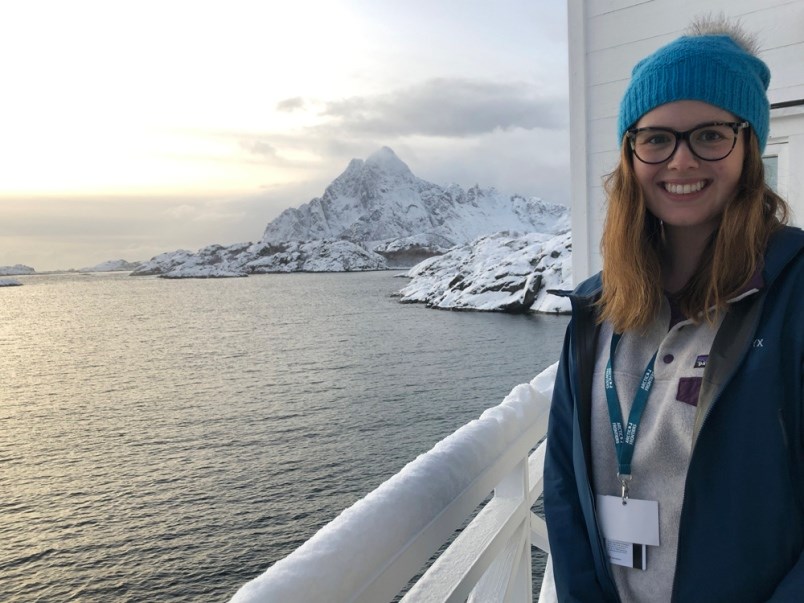Squamish’s Chloe Scott is a world away, but her heart is at home.
Scott, 29, was recently part of an international pool as one of only 30 under age 35 to attend Emerging Leaders — Arctic Frontiers, in Tromsø, Norway.
The Chief caught up with her by phone in London, where she is currently based, for a chat about what she has been up to including advocating for more of a voice for youth when it comes to Arctic policy.
What follows is an edited version of that conversation.
Q: When did you head to London?
A: I made the move about a year ago. I was accepted to grad school so I began my studies and completed my Master’s of Science and International Business. This led me to study Arctic Development Co-operation. I graduated in December, in London. I completed my last semester of school in South Africa with the London School of Economics, on a summer program.
Q: You were studying the Arctic in South Africa?
A: The research was focusing on development co-operation. South Africa and the Circumpolar Arctic have huge similarities in terms of international interest in their respective resources.
[The Circumpolar Arctic refers to northern lands of the world’s eight northernmost countries: Canada, Finland, Denmark, Iceland, Norway, Russia, Sweden, and the U.S. (Alaska).]
There’s a lot of international geopolitics that go on with vying for the respective resources of the Arctic and South Africa. One example is looking at the Northern Sea Route as an extension to the Belt and Road Initiative, the Polar Silk Road.
There were some interesting parallels.
I am applying for my PhD because I love my research so much I feel like I barely grazed the surface.
Q: And what are you currently working on back in London?
A: I am working with the U.K. Polar Network — a group of young polar researchers in both the social science side of Arctic relations, as well as the sciences, so looking at glaciology and climate change. The Arctic is really being used as a litmus test to gauge the effects of global warming and climate change.
Q: When you were a little girl, did you have this interest in the Arctic?
A: Of course Squamish is by no means Arctic, but my interest in this area of research stems from my childhood in Squamish where we were outside more than inside and out in the mountains and on snow. Coming from a family of skiers, that was probably quite influential for me.
Q: Can you tell me a bit more about the Norway trip for Emerging Leaders with Arctic Frontiers?
A: It is a very large conference that brings people from various backgrounds together. It is a place where people from all areas of research and development come together and discuss what their work is and how we can all be more transparent.
There were six of us from Canada. We connected as a group on a variety of topics — such as conservation and protection of Arctic peoples and Indigenous groups in the Arctic. There were 14 countries represented there. That was incredible.
One of our missions was to establish a singular message to share with the leaders at the conference and the proposal at the end of that was to have an Arctic Youth Council. Right now there is an Arctic Council and that consists of the eight countries. We really felt strongly that there should be a youth voice on the council.
There’s been fire lit within our group to see some change and it was amazing to be a part of.

Q: For younger people who may be reading this in Squamish, how could they get involved with this issue?
A: I think there are so many interesting projects and teachers in Squamish who are passionate about this kind of work and so starting a project within your classroom or school can influence you getting experience at the grassroots level and making some small changes.
You don’t have to go to the North Pole to understand some of these issues. It is very cool to see in person, but there’s a lot that can be done just by starting with grassroots projects. Take up opportunities that are available such as writing competitions, for example. Those things really did lead me down this path.
Q: You visited the high Arctic, what was the biggest surprise for you about it there?
A: It was actually so much like home. Especially living in London, going there made me more homesick [for Squamish] than I expected. It has the Sea to Sky feel with the oceans and the mountains.
I think my time in London will be short-lived because mountains are home to me.
Q: What is next for you? Any trips planned back to Squamish?
A: I am off to Iceland next, for a course, which is looking at Arctic geopolitics. After that, I will be home for a bit in the summer.
Q: What is your end goal?
A: I am keen on raising more awareness about how Arctic issues can be impacted by positive public and social policy.
Q: What resources would you point to if someone were to want to become more educated on this topic?
A: There is a woman named Jill Heinerth, the Royal Canadian Geographical Society explorer-in-residence. She did a project called “Arctic on the Edge,” on YouTube. She is an inspiration to me.
Read more from



